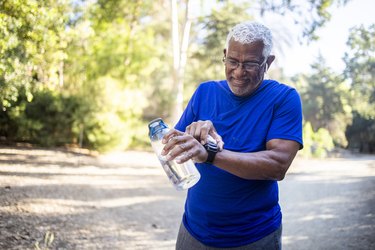
If you're trying to build muscle, you're probably on top of your workouts. But there's more to adding size than squats and biceps curls.
"If your goal is to build muscle and you are sticking to your workout routine, you are only part of the way there," David Chesworth, ACSM-CEP, exercise physiologist and program director at Hilton Head Health wellness resort, tells LIVESTRONG.com. Supporting your gym efforts with recovery strategies will get you the rest of the way.
Video of the Day
"The harder you work out, the harder you need to recover," Chesworth says. Without recovery, your muscles can't repair and rebuild. And if your muscles can't repair and rebuild, they can't bounce back bigger and better than before.
Luckily, there are some straightforward strategies you can use to encourage muscle recovery in between strength sessions. And the best part is they can be easily incorporated into your nightly routine. Do these four things every night to see gains.
1. Get Plenty of Sleep
Few habits will help you build muscle as effectively as getting enough sleep every night. "Sleep is when the magic happens for muscle development," Chesworth says.
For example, the dreamless non-REM sleep phase activates hormones involved in protein synthesis (the process of creating protein), according to an October 2014 review in Sports Medicine. This helps repair damaged muscle tissue, allowing muscles to grow back bigger and stronger.
Plus, skimping on sleep can harm your workout the following day. According to a June 2022 review in Sports Medicine, getting fewer than six hours of sleep significantly affected lower-body strength during afternoon workouts.
"If you don't get enough sleep, physical gains will be unlikely to occur, despite consuming protein and hitting the weights," Erin Nitschke, CPT, certified personal trainer and health coach, tells LIVESTRONG.com.
If you want to build muscle, aim for at least seven hours of quality sleep per night, according to the Centers for Disease Control and Prevention (CDC).
2. Limit Stress Before Bed
To maximize the muscle-building benefits sleep offers, minimize pre-bedtime stress. "Limiting stress may not help build muscle per se, but it can help prevent muscle loss," Todd Buckingham, PhD, exercise physiologist and visiting professor at Grand Valley State University in Michigan, tells LIVESTRONG.com.
When stressed, your body releases a hormone known as cortisol. Cortisol is a catabolic hormone that breaks down molecules (such as proteins and fats) for your body to use for energy, Chesworth says. While this process is helpful at times — like during exercise, when your body craves fuel — it's counterproductive when building muscle tissue.
Chesworth recommends avoiding activities that spike your heart rate or induce anxiety before bedtime, as these will release cortisol. "So, things like reading bad news, watching a dramatic movie, consuming caffeine or alcohol and exposing yourself to too much blue light [from electronic screens]," he says.
Instead, find calming activities that help you wind down. These could include stretching, breathing exercises, reading a book (no murder mysteries or thrillers!), taking a bath, listening to relaxing music or taking a leisurely walk.
Or, try Nitschke's bedtime go-to: legs up the wall yoga pose ((Viparita Karani). To do it, lie face-up on the floor and raise your legs straight up to rest against a wall. If needed, scoot forward so your glutes also touch the wall. Relax into that position for 10 minutes. Cue the calm.
3. Choose a High-Protein Snack
As the building block of lean tissue, protein is a must for gains. "It's critical to ensure we're consuming enough protein to not only sustain current muscle mass, but to build new tissue and repair any damage," Nitschke says.
If you need a bedtime snack, choosing a protein-rich food may be a smart move. According to a June 2020 review in Physical Activity and Nutrition, ingesting 40 to 48 grams of casein protein (found in milk) 30 minutes before sleep may help keep the muscle-building process humming along while your body rests.
But for this strategy to work, you have to strength-train first. "You can't just consume protein before bed and expect it to build muscle," Buckingham says. "You must perform a resistance- training workout and then consume the protein to get the benefit."
However, a May 2018 study in the Journal of the International Society of Sports Nutrition found that both daytime and nighttime casein consumption helped men boost muscle size. So, aiming for specific daily protein levels may be more important than the timing of your protein. Still, choosing protein for your bedtime snack — like cottage cheese, for example — can help you reach your daily protein needs.
Daily protein needs vary by person. However, the International Society of Sports Nutrition (ISSN) recommends aiming for 1.4 to 2.0 grams of protein per kilogram of body weight per day for building and maintaining muscle. For a 150-pound (68 kg) person, that equals roughly 95.2 to 136 grams of protein daily.
4. Watch Your Exercise Timing
As we mentioned earlier, resistance training is key for building muscle. However, pumping iron too close to bedtime may take you two steps forward and one step back.
As Chesworth explains, exercise puts stress on your body, which can counter the healing benefits of sleep. Moreover, some people struggle to wind down after a late workout. This can delay sleep and interfere with sleep quality, Buckingham notes. Neither of those outcomes helps build muscle.
However, if your schedule only allows for late workouts, you might choose to go for it. "If the evening is the only time you can do [strength training], you're more likely to build muscle doing that than you are by skipping strength training altogether," Chesworth says. But try to get your workout done earlier in the day.
How late is too late? That's unclear. However, a February 2020 study in the European Journal of Sport Science suggests you might be fine if you stop a moderate-intensity resistance workout 90 minutes before bedtime.
- Sports Medicine: "Sleep and Athletic Performance: The Effects of Sleep Loss on Exercise Performance, and Physiological and Cognitive Responses to Exercise"
- Sports Medicine: "Effects of Acute Sleep Loss on Physical Performance: A Systematic and Meta-Analytical Review"
- CDC: "https://www.cdc.gov/sleep/about_sleep/how_much_sleep.html"
- Physical Activity and Nutrition: "Pre-sleep casein protein ingestion: new paradigm in post-exercise recovery nutrition"
- Journal of the International Society of Sports Nutrition: "Daytime and nighttime casein supplements similarly increase muscle size and strength in response to resistance training earlier in the day: a preliminary investigation"
- ISSN: "International Society of Sports Nutrition Position Stand: protein and exercise"
- European Journal of Sport Science: "Moderate-intensity exercise performed in the evening does not impair sleep in healthy males"


